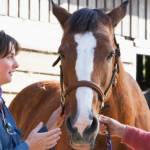Could Acupuncture Help My Horse?

Acupuncture is an ancient form of Chinese alternative medicine that has been used to treat diseases and provide pain relief to humans and animals for thousands of years. It achieves these claims through “applied stimulation at discrete and specific points in the body.” Acupuncture has grown in popularity in Western medicine, and its scientific efficacy in horses had been addressed recently.
A paper by Huisheng Xie* presented at the 2018 American Association of Equine Practitioners convention assesses the use of acupuncture in clinical equine medicine, including effects of this treatment modality on patients. “Xie found that various types of acupuncture, specifically dry needling, electro-acupuncture and aqua-acupuncture, affected lameness and pain scores, reproductive disorders, and even stem-cell mobilization,” described Laura Petroski-Rose, B.V.M.S., a Kentucky Equine Research veterinarian.
In a review of 327 racing Thoroughbreds that were assessed for pain using acupuncture, 54% (176) were suspected to have an issue with the metacarpophalangeal, or fetlock, joint. Of those 176 horses, all were found to be sensitive to needle placement at specific regions along the lumbar vertebrae, and 90% were sensitive to placement along the sacral bodies.
“Sensitivity in these areas, especially along the lumbar region, in horses with known hoof lameness could point to injury in the heel or even laminitis,” explained Petroski-Rose. “Information like this could be extremely helpful during a lameness examination and could potentially offer owners better pain-management options in horses with chronic laminitis or navicular syndrome,” she added.
In regard to pain management, electro-acupuncture appears to both reduce the levels of inflammatory factors in circulation and increase the concentration of B-endorphins and 5-HT in the body. “Both of these effects are thought to indicate significant pain relief and improve a horse’s chances for recovery from injury,” noted Petroski-Rose. Back pain and cervical stiffness were discussed in greater detail, and Xie concluded that acupuncture therapy in these areas provided significant pain relief, lasting as long as 20 days in the instance of thoracolumbar pain.
Another surprising finding is the positive effects electro-acupuncture therapy had on infertility by improving embryo quality, blood flow to the uterus, and the overall condition of the endometrium. “Evidence supporting the effect of acupuncture on human infertility has shown positive results; however, this has yet to be proven in the horse,” explained Petroski-Rose.
While we await further proof that acupuncture improves fertility rates in mares, be sure your broodmare is receiving quality nutrition. Contact a Kentucky Equine Research nutrition advisor for a diet consultation to ensure all nutritional needs are being met.
For broodmare health, consider adding an omega-3 fatty acid supplement to the diet. “Kentucky Equine Research developed EO-3, a potent marine-derived oil that is rich in omega-3 fatty acids. EO-3 contains the omega-3 fatty acids DHA and EPA, which have proven positive effects on reproduction, bone development, and numerous inflammatory conditions in horses,” stated Petroski-Rose.
Xie, H. 2018. Can acupuncture be used in equine practice? In: Proc. American Association of Equine Practitioners Convention. 64:320-329.








